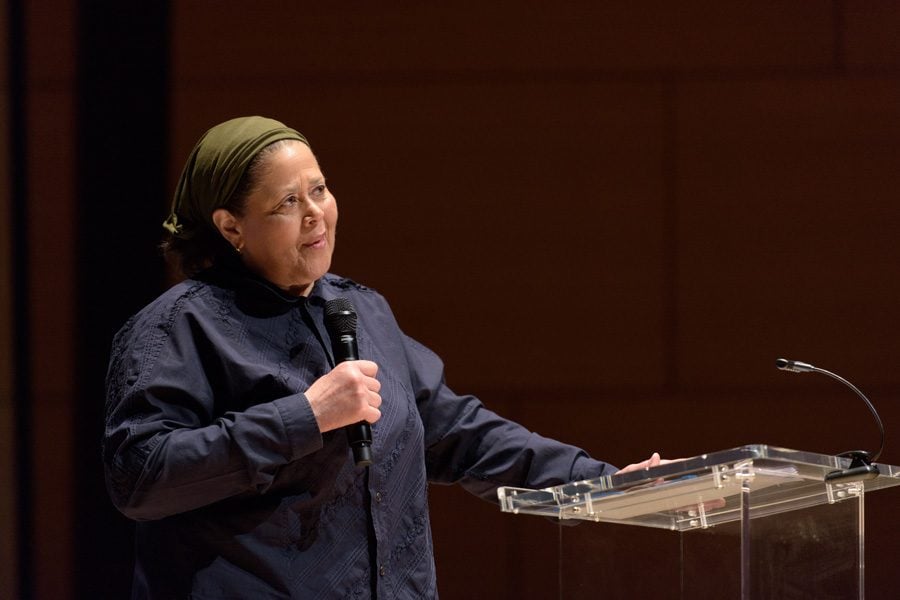‘The West Wing’ star focuses on educational, criminal injustice in play
Colin Boyle/Daily Senior Staffer
Anna Deavere Smith, known for her role as Dr. Nancy McNally, on NBC’s political drama, “The West Wing,” speaks at the Galvin Recital Hall in the Patrick G. and Shirley W. Ryan Center for the Musical Arts on Monday. Smith reenacted interviews conducted with people she thought were affected by the “school-to-prison pipeline.”
April 25, 2017
As actress Anna Deavere Smith interviewed a series of people for a research project regarding the systematic oppression of minorities within the education and criminal justice system, she was inspired to tell their stories in the format of a play.
“I do believe that people are talking a very beautiful language, which can be reiterated and grab hearts and minds,” said Smith, who is known for her role as Dr. Nancy McNally on NBC’s political drama, “The West Wing.”
Smith sampled pieces of her play “Notes From the Field” in front of more than 150 people at the Galvin Recital Hall in the Patrick G. and Shirley W. Ryan Center for the Musical Arts on Monday evening. The play, which tells the stories of people affected by the “school-to-prison pipeline” through various interviews, is the centerpiece of The Pipeline Project, an organization that encourages discussions beyond theater through public events.
The “school-to-prison pipeline” is a phenomenon that explains the lack of opportunity and resources available to people from low-income backgrounds and its correlation to the increasing number of juveniles in the criminal justice system, Smith said.
Smith said she began conducting the interviews in 2013 with students, educators, parents, incarcerated youth, correctional officers and community members, among others. Smith said her interviews focused on people from four main geographic locations: Northern California, Philadelphia, Baltimore and South Carolina.
Smith said interviewees recalled their stories with language that was “full of love for what they lost and what they would like to have restored.”
“I had the opportunity to sit in front of them when they try to make sense of it,” she said. “As they try to make sense of it they often restore their dignity.”
Smith began by acting out dialogue from Sherrilyn Ifill, president and director-counsel of the NAACP Legal Defense and Educational Fund. Smith — playing Ifill — said policymakers began investing in the prison system rather than education.
Other acts included reenactments from interviews with Kevin Moore, who recorded Freddie Gray’s arrest in April 2015, and a journalist’s account of an October 2015 incident where a girl was dragged out of her seat by a school police officer.
Sociology and African American Studies Prof. Mary Pattillo, who attended the event, said the emotions and “sheer power of voices” performed by Smith stood out to her. The content discussed during the event parallels the work of sociologists but was presented in a different way, Pattillo told The Daily.
“We write books about it, and she writes plays about it,” Pattillo told The Daily.
Smith said the term “school-to-prison pipeline” is unfair because it suggests that schools and teachers are to blame for several generations of poverty in this country.
Rather, Smith said she sees schools more as an institution that can address the issue.
“If we expect schools to be that intervention, that remedy, then we have to give them more support and be able to use more imagination to think about what schools can be,” Smith said.
For Smith’s last act, she reenacted an interview of U.S. Rep. John Lewis (D-Ga.). Smith told the story of how Lewis was able to forgive someone who attacked him while he was participating in a Freedom Ride in 1961.
Smith said she wanted to end her talk on a message of hope, which was best expressed through Lewis’ message. Hope is a “leap of faith” to create new possibilities based on “visions that become contagious,” Smith said.
NU alumna Lisa Elliott (Communication ’89), said she attended the event because she enjoyed seeing a black actress at her old campus. Elliott said Smith has a way of telling a story that brings that person to life.
“Even with her just standing there without a costume … I can see the setting, I can see the situation,” Elliott said. “That’s what a powerful actor does.”
Email: alanperez2020@u.northwestern.edu
Twitter: @_perezalan_



